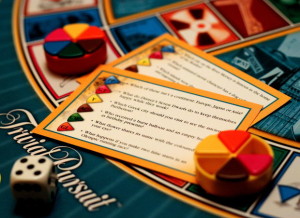It’s the first Friday of the month. Time for another fiction installment.
A link to this story, and all prior stories, can always be found under the “My Work—Freebies” tab.
Just Say Utah
“Oh, it is so on!” Patty said, glaring at her brother and his two friends.
The boys stood in the dining room, arms crossed over their chests, smug smiles on their barely adult faces.
Patty grabbed Dana’s hand and said, “Chelsea, come on!” She yanked on Dana’s arm so hard, the shoulder joint jerked in the socket. The girls followed Patty as she stalked to the den and grabbed a game off the shelf.
“Oh, come on,” Dana moaned. “I hate Trivial Pursuit.”
“Yeah, P. That’s lame,” Chelsea said.
“Did you hear them? They think that because they go to Carnegie Mellon they’re so much smarter than we are.”
“Um, Patty. I go to Carnegie Mellon, too,” Chelsea said.
“Yeah, but they’re seniors and you’re just a freshman.” It was winter break, and they were all home from their respective schools until spring semester started. Joey had been tormenting his sister mercilessly about going to a state school, while he and his friends went to an elite private school. She was obviously desperate, again, to prove to him that she was just as smart as he was, if not smarter. It was an argument that occurred between the two of them at least once a week when they were together. She somehow always lost.
“Patty Ann, it just snowed. We can pelt them with snowballs and then go sledding. I bet your mom will make cocoa. Or mine will.” Dana hated Trivial Pursuit with a passion.
Patty took the box and headed for the dining room. “Girls against… the dumber sex. And may the best team win.”
She plunked the box on the table and grinned at the boys. “Or are you chicken?”
“Against the three of you?” Joey laughed while Troy and Mike snorted and elbowed each other. “We’ll take our chances. We’ll even give you a handicap. How many chips do you want us to spot you?”
“We don’t need a handicap, thank you very much.” Patty set up the game and grimaced at her brother and his friends.
“Come on,” Mike said. “State school versus private? What chance do you have?”
“I go to the same school you do!” Chelsea said.
“Really?” Mike asked. “How’d you ever get in?”
Chelsea lunged at him, and Patty pulled her back. The two of them had disliked each other since grade school. Mike had looked up the skirt of her uniform from under the bleachers at a school assembly and taken a photo, and then he got suspended for it. He blamed her for his suspension although she wasn’t the one who told on him. Patty saw the game getting ugly before it even started.
“Let’s keep it civil, okay?” she said, looking right at Mike. “Team meeting before we start.” She gathered the girls together.
“What’s the plan?” Dana asked.
“We each need to focus on our strengths,” Patty said. “Chelsea, you’re a writing major, so literature is you. And maybe entertainment.”
“We should all be good at entertainment,” she answered, “if the questions are new enough.”
“They aren’t. This is the first edition. My mom knows half the answers.”
Chelsea and Dana both groaned.
“Okay,” Patty continued, ignoring the girls. “I finally got into my core classes this term, so I had two sciences in addition to my teaching courses. I’ll take responsibility there.”
“Sounds fair,” Chelsea said. “I just finished two world history courses, so hopefully I’ll remember something. And if the questions are more about sports and less about leisure, we should be good between the two of us.”
“Agreed,” Patty answered. Both girls loved and followed many professional sports, so she felt confident between the two of them. Then she looked at Dana, who wasn’t even paying attention any longer. Dana was a Philosophy major. What did Philosophy majors even study, anyway? She turned back to Chelsea. “How are you at Geography?”
“I suck. You?”
“No better. I guess that’s Dana’s area, then.”
“Huh?” Dana said.
“Forget that,” Chelsea said. “She can’t find her way across the street without a map, and then she can’t read it. We’ll just have to hope for an easy chip question then.”
“Okay, I guess we’re ready,” Patty said.
“Let’s play,” Chelsea said.
Patty nudged Dana and they turned to the boys and the board. “Roll to see who’s first.”
The game consisted of more trash talk and less civility than a trivia game would have on a winter break in someone’s home. Occasionally someone ran to the kitchen for drinks or snacks, but mostly the six students stayed glued to the table, riveted by the board and the cards. After three hours, the girls were up by one chip and had landed on the Geography triangle.
“Blue for the chip!” Patty said.
“Crap,” Chelsea said so only Patty could hear. “It’s Geography.”
“We’ll be fine. Listen to the question.”
Joey read the card. “What’s the only state in America to end with the letter K?”
“End in K. What state ends in K?” Patty yelled.
“Stop yelling,” Dana said.
“Don’t tell me not to yell!” Patty yelled, waving her fists in the air. “It’s for a chip!”
“Okay, so we’ll guess the answer,” she said, and munched on a pretzel.
“Guess the answer! You haven’t guessed one answer right all day! And we’re winning! We could go ahead by two. By two! And this is geography. Geography!” Patty said.
“So guess Utah.”
Patty and Chelsea both stared at her. Joey’s eyes bulged, Mike covered his mouth and Troy turned some noise into a cough. Patty suspected it was laughter, but she was too flummoxed to address it at the moment.
“I’m sorry, what? Did you say Utah?”
“Yeah. Utah.”
Mike also began coughing.
Chelsea said, “You heard them say ‘K’ didn’t you? The state ends in K.”
“Yeah, I heard.”
Patty looked at Chelsea, whose eyes were growing wider by the second. Chelsea shook her head to clear it, like she was clearing an Etch-a-Sketch screen.
Patty said, “Okay. Let’s start at the top and work our way down. Maine, New Hampshire, Vermont, New York, Massachusetts, Rhode Island, Connecticut, New Jersey, Pennsylvania—”
“I’m telling you, it’s Utah.”
“Are you kidding me?” Patty said.
A snort burst out of Joey.
“Just say Utah.”
“Let’s start over,” Chelsea said. “Maine, New Hampshire, Vermont.”
“New York, Massachusetts, Rhode Island,” Patty continued.
“Just say Utah. It’s Utah.”
“Oh my God! What is wrong with you?” Chelsea asked.
“It’s Utah.”
“It. Is. Not. UTAH!” Patty said.
All three of the guys laughed at Patty’s outburst, but there was nothing she could say. It was ridiculous. If she heard ‘Utah’ one more time, she might shove the blue pie piece up Dana’s nose.
“Maybe if we did it alphabetically?” Chelsea said.
“Alaska, Alabama,” Patty said.
“You’re already out of order, genius,” Joey said.
“Shut up, Joe. At least I have a real major. I don’t just blow into a horn all day long.”
“Being a music major at CMU is harder than being an education major where you go, so blow on that,” he said.
“Well, I go to CMU, and I have a real major, so you both can shut up,” Chelsea said. Turning to Patty, she said, “I can’t do it alphabetically. There’s Alaska, Arkansas… too many Ks. Let’s start at the top again.”
“There’s Maine, New Hampshire,” Patty said.
“Vermont, New York, Massachusetts,” Chelsea said.
“Utah,” Dana’s soft voice chimed in.
Chelsea threw her head down on the table.
“I’m going to kill you,” Patty said.
“What?” Dana asked. Patty wasn’t sure if the innocence in her voice was true or if she was mocking her.
“Why in God’s name do you think it’s Utah?” Chelsea asked. “There isn’t a single K in the entire word.”
“It’s only four letters long,” Dana said.
Patty glared at her. “The question isn’t ‘What’s the only state with four letters?’ And by the way, Utah isn’t the only state with four letters, there’s also Ohio, so what is your obsession with Utah?”
“H is close to K. So I figured it’s probably a trick question, and the answer is Utah.”
“You think it’s a trick question?” Chelsea asked.
“There are trick questions sometimes.”
“And if this is a trick question, the answer isn’t going to be that there aren’t any states that end in K,” Patty said. “The answer will be Utah, because H is near K in the alphabet.”
“Well, when you say it like that it just sounds stupid.”
“You think?” Patty said.
“Now you’re just being mean,” Dana said.
“Shut up.”
The guys were laughing so hard that they had red faces and tears in their eyes. Patty ignored them. She and Chelsea went through all fifty states, including Utah, at least three times, but neither of them could figure out which one ended in K. It didn’t help that Dana was sitting there muttering “Just say Utah” under her breath as they recited state names.
After about twenty minutes passed, Joey said, “I realize there’s no time limit, but at some point you really need to take a guess.”
Patty refused to include Dana in the decision, but she looked at Chelsea, who shrugged. “I haven’t got a single idea. We’ve been through them all. We’ve been through the territories. I don’t know.”
Dana didn’t say any words, but she hummed four syllables that sounded like, “Just say Utah” in Patty’s head. Patty refused to acknowledge her. “Chels, what do you want to guess?”
“Your game, your call.”
Patty banged her head down on the table so her hair covered her face. She mumbled something unintelligible.
“Sorry, sis, we didn’t catch that,” Joey said.
“Utah!”
The guy hooted and hollered for a full five minutes before they informed the girls the answer was New York.
Patty was livid. Had Dana been quiet, they would have gotten it right. They had mentioned New York at least six times, but never heard it because of her ‘Just Say Utah’ mantra.
The girls never got another chip. The guys beat them within the hour.
Then the girls lured them outside and creamed them in a snowball battle. Patty might have hit Dana with one or two when she wasn’t looking.


 is it me, or is it WordPress?) to make navigation easier, the toolbar cleaner, and to make room for a new feature here: fiction.
is it me, or is it WordPress?) to make navigation easier, the toolbar cleaner, and to make room for a new feature here: fiction.
 Happy New Year!
Happy New Year!










